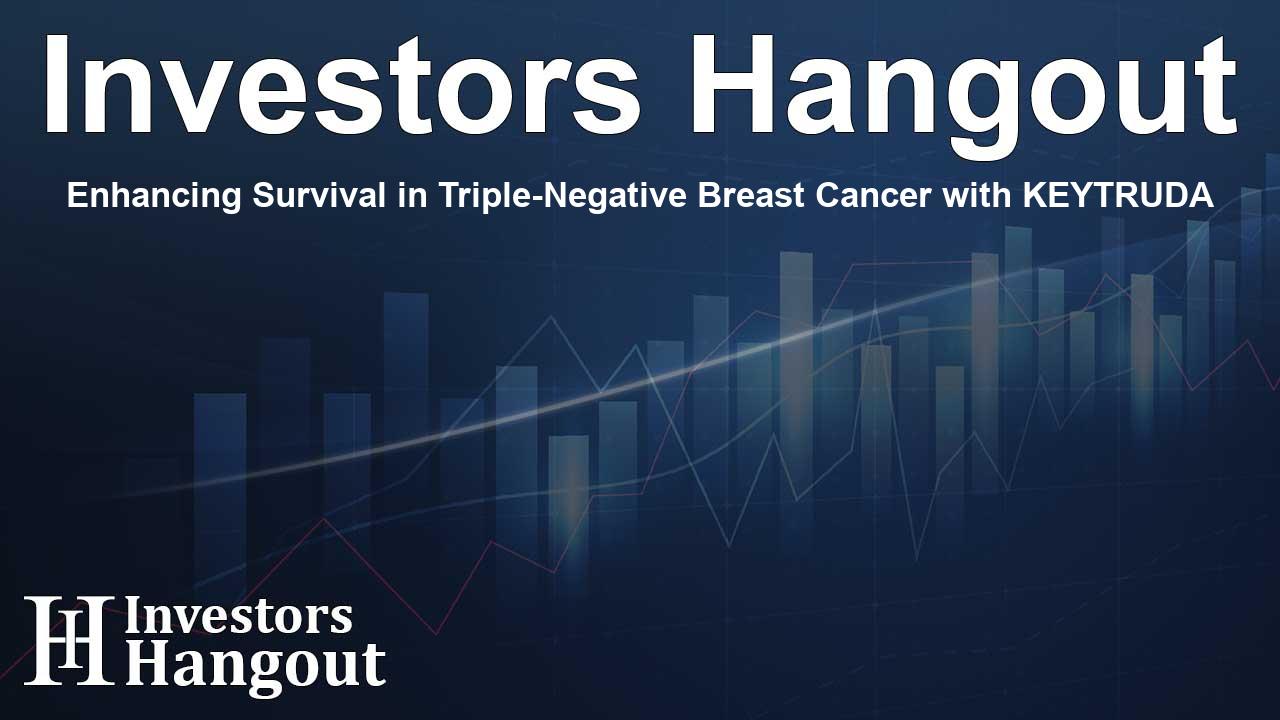Enhancing Survival in Triple-Negative Breast Cancer with KEYTRUDA

Significant Advances in Triple-Negative Breast Cancer Treatment
Merck, a leading pharmaceutical company, has recently made headlines with the presentation of groundbreaking overall survival results from the Phase 3 KEYNOTE-522 trial. This trial evaluated the efficacy of KEYTRUDA (pembrolizumab), in combination with chemotherapy before surgery, and as a standalone treatment afterward for high-risk early-stage triple-negative breast cancer (TNBC). These findings highlight the substantial impact of KEYTRUDA on patient outcomes, showcasing a 34% reduction in the risk of death compared to traditional chemotherapy alone.
KEYTRUDA's Trial Outcomes
Phase 3 KEYNOTE-522 Trial Results
During a median follow-up of over 75 months, data indicated a five-year overall survival (OS) rate of 86.6% in patients treated with the KEYTRUDA regimen, starkly contrasting with an 81.7% rate for those receiving chemotherapy without KEYTRUDA. This remarkable difference emphasizes the critical role of immunotherapy in enhancing survival rates for patients facing this aggressive form of breast cancer.
Consistency Across Subgroups
Moreover, the benefits of the KEYTRUDA regimen were consistent across various pre-specified exploratory subgroup analyses. Patients defined by factors such as PD-L1 expression, tumor size, and nodal status all reaped significant survival advantages from this innovative treatment approach. Such results reinforce the relevance of KEYTRUDA in offering personalized treatment options for those diagnosed with TNBC.
Clinical Significance and Expert Insights
Dr. Peter Schmid, the lead of the Centre for Experimental Cancer Medicine, emphasized, "These impactful overall survival results add to the previously reported data showing significant benefits in pathological complete responses after treatment with KEYTRUDA. Our findings bolster the importance of this regimen in treating high-risk early-stage TNBC and underscore its potential to change the clinical landscape for patients."
A Groundbreaking Treatment Option
Dr. Gursel Aktan, vice president of global clinical development at Merck, noted, "KEYTRUDA is the first immunotherapy regimen that has shown a statistically significant and clinically meaningful improvement in overall survival in patients with high-risk early-stage TNBC, compared to chemotherapy alone. This milestone demonstrates our commitment to extending lives through innovative cancer therapies across various disease stages."
Broader Impact on Oncology Research
The KEYNOTE-522 trial is part of an extensive clinical research program investigating the role of KEYTRUDA across multiple cancer types. This trial is significant not just for breast cancer patients but also represents an umbrella of studies totaling more than 1,600 trials aimed at understanding the full potential of KEYTRUDA in oncology. With a focus on various tumor types and stages, Merck aims to broaden treatment options, improve patient outcomes, and enhance understanding of cancer immunotherapy.
About Triple-Negative Breast Cancer
Triple-negative breast cancer (TNBC) represents a particularly aggressive subset of breast cancer characterized by a lack of hormone receptors. It occurs in roughly 10-15% of patients diagnosed with breast cancer and has the highest risk of recurrence within the first five years following diagnosis. The implications of missing key hormone receptors make TNBC harder to treat, emphasizing the need for innovative therapies like KEYTRUDA.
Insights into Merck’s Research Efforts
Merck's dedication to improving treatment outcomes for women facing breast and gynecologic cancers is evident through ongoing research initiatives. With over 20 clinical trials currently underway, Merck seeks to elevate the standard of care in women’s cancers, bridging the gap in treatment options and aiming for better survival rates.
Conclusion
The recent findings from the KEYNOTE-522 trial offer a glimmer of hope for high-risk early-stage triple-negative breast cancer patients. With KEYTRUDA showing promising results in improving survival rates, both Merck and the oncology community are optimistic about the future of cancer therapy and the potential for greater access to effective treatments.
Frequently Asked Questions
What is KEYTRUDA?
KEYTRUDA is an anti-PD-1 therapy used to enhance the body's immune response against cancer cells. It is employed in various cancer treatments, including triple-negative breast cancer.
How does KEYTRUDA work for TNBC?
KEYTRUDA works by activating the immune system to identify and attack tumor cells, specifically in patients with aggressive types of breast cancer like TNBC.
What were the results of the KEYNOTE-522 trial?
The trial demonstrated a 34% reduction in the risk of death for patients receiving KEYTRUDA plus chemotherapy compared to those receiving chemotherapy alone.
Who can benefit from KEYTRUDA?
Patients with high-risk early-stage triple-negative breast cancer, particularly those whose tumors express PD-L1, stand to benefit the most from KEYTRUDA.
What is the significance of the trial's findings?
The findings underscore the relevance of immunotherapy in treating high-risk cancers and could lead to changes in treatment protocols for improved patient outcomes.
About The Author
Contact Lucas Young privately here. Or send an email with ATTN: Lucas Young as the subject to contact@investorshangout.com.
About Investors Hangout
Investors Hangout is a leading online stock forum for financial discussion and learning, offering a wide range of free tools and resources. It draws in traders of all levels, who exchange market knowledge, investigate trading tactics, and keep an eye on industry developments in real time. Featuring financial articles, stock message boards, quotes, charts, company profiles, and live news updates. Through cooperative learning and a wealth of informational resources, it helps users from novices creating their first portfolios to experts honing their techniques. Join Investors Hangout today: https://investorshangout.com/
The content of this article is based on factual, publicly available information and does not represent legal, financial, or investment advice. Investors Hangout does not offer financial advice, and the author is not a licensed financial advisor. Consult a qualified advisor before making any financial or investment decisions based on this article. This article should not be considered advice to purchase, sell, or hold any securities or other investments. If any of the material provided here is inaccurate, please contact us for corrections.
